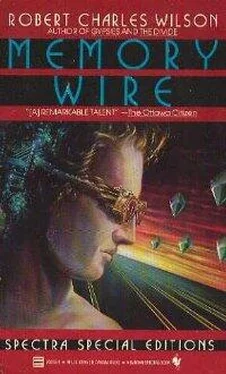Robert Wilson - Memory Wire
Здесь есть возможность читать онлайн «Robert Wilson - Memory Wire» весь текст электронной книги совершенно бесплатно (целиком полную версию без сокращений). В некоторых случаях можно слушать аудио, скачать через торрент в формате fb2 и присутствует краткое содержание. Год выпуска: 1987, ISBN: 1987, Издательство: Bantam Spectra, Жанр: Фантастика и фэнтези, на английском языке. Описание произведения, (предисловие) а так же отзывы посетителей доступны на портале библиотеки ЛибКат.
- Название:Memory Wire
- Автор:
- Издательство:Bantam Spectra
- Жанр:
- Год:1987
- ISBN:978-0-553-26853-9
- Рейтинг книги:4 / 5. Голосов: 1
-
Избранное:Добавить в избранное
- Отзывы:
-
Ваша оценка:
- 80
- 1
- 2
- 3
- 4
- 5
Memory Wire: краткое содержание, описание и аннотация
Предлагаем к чтению аннотацию, описание, краткое содержание или предисловие (зависит от того, что написал сам автор книги «Memory Wire»). Если вы не нашли необходимую информацию о книге — напишите в комментариях, мы постараемся отыскать её.
Memory Wire — читать онлайн бесплатно полную книгу (весь текст) целиком
Ниже представлен текст книги, разбитый по страницам. Система сохранения места последней прочитанной страницы, позволяет с удобством читать онлайн бесплатно книгу «Memory Wire», без необходимости каждый раз заново искать на чём Вы остановились. Поставьте закладку, и сможете в любой момент перейти на страницу, на которой закончили чтение.
Интервал:
Закладка:
Both of us outlaws, Keller thought. But so different.
“It’s only a place,” Keller said.
“The Basin,” Byron said. “The River—Rio Mar, the River Sea. The Amazon, Ray. Heart of Weirdness.”
Keller smiled steadily. “Bullshit.”
“You plugged in yet?”
“Not for a couple of hours.”
“So… your last meal as a human being.”
The waitress brought his sandwich, and Keller looked at it without enthusiasm. “Is that how you think of it?”
“I did your job once.”
“Yours is better?” He shrugged.
“Drug pusher,” Keller said. “Not exactly.”
Keller ate, and Byron continued to grin until Keller began to find the grin an irritation, a kind of insult. It is bullshit, he thought suddenly—the grin, the swagger, the faded khaki; all of it, all hype.
“Don’t repress,” Byron said. “Tell me what you’re gritting your teeth about.”
Because he was irritated, and because the friendship was old enough and sturdy enough, he did so.
“Maybe,” Byron conceded. “Maybe I’m a fake. You include yourself in that, Ray? The walking eye? The man who had his humanity shot off in the war?”
Keller winced. “I include myself,” he said.
“But of course. Objectivity—yes? How could you not include yourself?”
“At least you don’t deny it.”
“Wouldn’t dream of it,” Byron said. “But you’re wrong, you know, if you believe that about Teresa.”
“I haven’t met Teresa.”
“It’s for her sake. All this is for her sake.”
Keller put his card in the table slot and stood up.
“Think about it,” Byron said, lost now in some thought of his own. “Everything moves in circles. The Wheel, Ray. Everything returns.”
3. Leiberman’s office was a shabbily genteel building in the Hollywood Hills, pastel stucco and a discreet sign: it could be mistaken for an abortion clinic. It was, of course, much more than that. Leiberman was the Network’s neurotechnician of last resort: implanting vapid actors with digital prompters to whisper their dialogue to them; boosting their stage presence or neutralizing their stage fright with his pharmacopoeia of narrow-gauge psychochemicals; sometimes installing AV blanks for Angels like Keller… performing any medical work that must not suffer the scrutiny of the legal guard dogs. In Leiberman’s office no real records were kept; no names, no credit lines, no phone numbers.
Inside, Leiberman’s secretary smiled at him. He handed her the note, his passport. Her eyes glittered icily. “Go on in,” she said.
The inner office was Leiberman’s workroom, a glass-and-chromium chamber, surgical instruments dangling on coiled wires from the ceiling. Leiberman greeted him and ushered him to a chair. Leiberman was plump, bald, grossly physical; his surgical smock was tight across his belly. “This shouldn’t take long,” he said. “Remove your shirt. Sit.”
The access socket was embedded between Keller’s shoulders next to the spine, a couple of millimeters under the derma. “Army workmanship,” Leiberman clucked, exposing and sponging that bit of metal; but it was only professional rhetoric: the socket did its job. On his first visit, Leiberman had run a deep neurological scan and admitted that the actual wirework was excellent: biosynthetic tendrils much thinner than hairs sampling Keller’s visual cortex, his auditory ganglia. He had never needed upgrading or repair. Leiberman’s job was to seal and unseal the skin, keep the socket sterile, and install a passive AV memory to store Keller’s data.
“Fine new ones these days,” Leiberman said. He removed the AV memory from a sterile perspex pack. It was smaller than Keller remembered, a snowflake between the prongs of Leiberman’s tweezers. “You can get up to two years continuous realtime on one of these—audio and video. And it’s sturdier into the bargain. New materials. Well, you know.”
Keller sat with his head immobilized in a skull clamp while Leiberman worked. Installing the memory, the testing of it, sent little back-EMF blips surging into Keller’s brain. His visual cortex lit up: impossible mandalas blossomed and flared on his eyelids. The subdued anger that had been riding him since lunch began abruptly to fade. Surrendering to the process, he thought, that was what it was all about. It was surrender that had saved him. In this cool ice envelope, Camera Eye, Recording Angel, he was preserved from the ravages of real memory.
He relaxed and watched the misfiring of his visual ganglia, cascades of blue electric fire. The vision consumed all of Keller’s attention until Leiberman withdrew his tools and the surgical studio snapped back into focus.
“You’re fixed,” Leiberman said.
He was. He felt it. Nothing specific, simply an aura of heightened awareness that was not even physiological: only the knowledge that he was an Angel again, that everything he saw and heard was being quietly recorded on the molecular memory Leiberman had installed.
He turned to look at the neurosurgeon, and it was a different motion now, a pan-and-sweep, coolly professional.
Leiberman frowned. “Don’t stare,” he said. “It’s impolite.”
4. Keller’s neural harness had been installed at an Army staging base in Santarem during the long Brazilian conflict. Keller had been shipped in from frontline action along the contested highway BR-364 in Rondonia, in a condition the military doctors called “emotional dysfunction.” He had surprised them by asking for Angel duty.
Every combat unit had an Angel. It was Army policy. The Angel performed essentially the same role in an infantry platoon that the black box, the flight recorder, performed in the cockpit of a passenger airliner—“box” was one of the politer epithets for a Recording Angel. Byron Ostler, Keller’s own platoon Angel, had explained it to him one time. Because an Angel was in effect the ultimate intelligence unit, carrying an unimpeachable record of combat action, Angels were entitled to certain benefits. They were not obliged to do heavy physical work. In combat they were scrupulously defended by their fellow soldiers. They wore special protective clothing, and other people humped their supplies for them.
They were shunned, of course, socially. But they were also exempt from the hard equations of triage: it was Med Corps policy that Recording Angels received priority medical attention.
If they died, their bodies were recovered.
In all these customs and regulations there was no concern for the individual Angel, only for his neural harness, his AV memory, his ultimate debrief ability… but that was okay, Keller thought. That was just Army.
The hospital at Santarem was a very loose unit. The nurses were civilians, the doctors volunteers. The building was makeshift, an ambling single-story structure electronically sealed against insect traffic. Keller lay in a ward with twenty strangers united by their fear of the impending surgery. They read American paperbacks or looked at the Portuguese sex comics that arrived in box loads from Sao Paulo every Tuesday. They listened to the drone of troop carriers and the white hiss of the air-conditioning; they played cards. One by one they were wheeled away and came back wired.
Keller had known it was dangerous surgery. They all knew. The army did it a dozen times daily in installations like this, but still it was dangerous. It could not be otherwise, messing with your brain like that. The brain, Keller thought, was delicate, fragile. Thread it with those wires and you could lose something. Before he volunteered for Angel duty, Keller had purloined a medical text and checked it out. Theoretically it was simple: the “wires” were living bio-synthetic tissue, designed to grow unobtrusively into the brain, built with tropisms that would carry them deep into the visual cortex. An automatic process. But the book referred also to the symptomology of implant failure, a long and daunting list. Partial or total loss of the visual field; dysphasia, aphasia; disorientation, memory loss; impairment of limbic function; flattening or disturbance of emotional affect. His palms dampened at the thought. Still, he had been deemed suitable for this work and had—it was elective—volunteered.
Читать дальшеИнтервал:
Закладка:
Похожие книги на «Memory Wire»
Представляем Вашему вниманию похожие книги на «Memory Wire» списком для выбора. Мы отобрали схожую по названию и смыслу литературу в надежде предоставить читателям больше вариантов отыскать новые, интересные, ещё непрочитанные произведения.
Обсуждение, отзывы о книге «Memory Wire» и просто собственные мнения читателей. Оставьте ваши комментарии, напишите, что Вы думаете о произведении, его смысле или главных героях. Укажите что конкретно понравилось, а что нет, и почему Вы так считаете.












